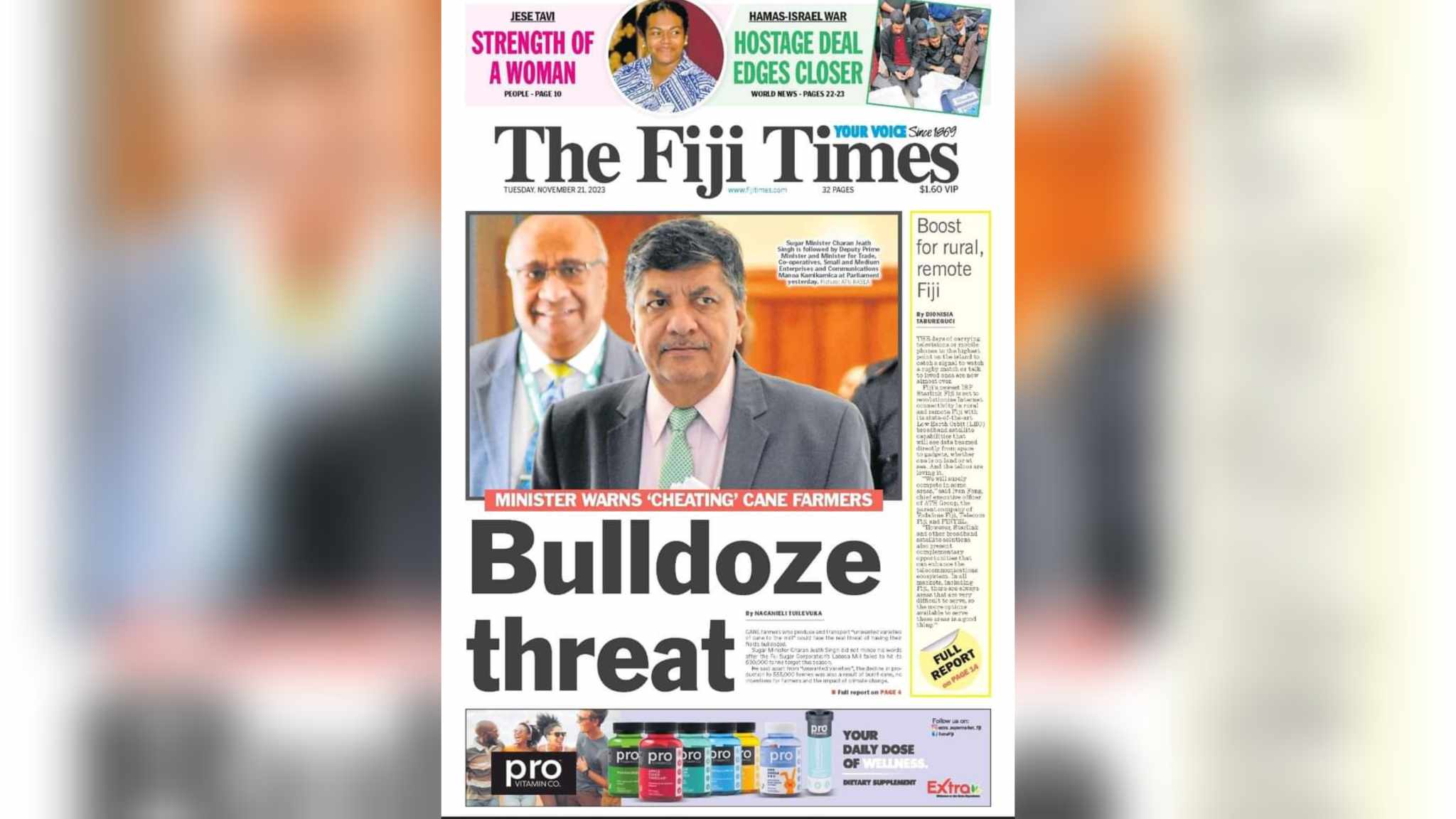Bula
Cane farmers who produce and transport “unwanted varieties of cane to the mill” could face the real threat of having their fields bulldozed.
Sugar Minister Charan Jeath Singh did not mince his words after the Fiji Sugar Corporation’s Labasa Mill failed to hit its 630,000 tonne target by 75,000 tonnes.
He said apart from “unwanted varieties”, the decline in production to 555,000 tonnes was also a result of burnt cane, no incentives for farmers and the impact of climate change. That’s the big news on the front page of the Fiji Times for Tuesday, November 21.
In the second story on the front page, the days of carrying televisions or mobile phones to the highest point on the island to catch a signal to watch a rugby match or talk to loved ones are now almost over.
Fiji’s newest ISP Starlink Fiji is set to revolutionise Internet connectivity in rural and remote Fiji with its state of the art Low Earth Orbit (LEO) broadband satellite capabilities that will see data beamed directly from space to gadgets, whether one is on land or at sea. “We will surely compete in some areas,” said Ivan Fong, chief executive officer of ATH Group, the parent company of Vodafone Fiji, Telecom Fiji and FINTEL.
Synopsis
A report stating marine plastic pollution can generate significant economic costs that are associated with loss in revenue from tourism, fishing, aquaculture, transport, and other ocean-based activities is a concern.
Despite stringent controls on the usage of plastic, the recently released report is forecasting total costs due to plastic waste between 2023-2040 to be at an estimated $4 billion, while costs of plastics on marine ecosystem losses will be $3 billion in the same period.
Titled “The economic impact of plastic pollution and the benefits of reducing mismanaged waste in Fiji”, the report was released by the International Union for Conservation of Nature (IUCN).
The IUCN report states in 2019 public solid plastic waste management costs amounted to $3,187,920 and that 19,674 tons of plastic waste generated in 2019. Annual estimated amount of waste disposed of through formal waste management processes in 2019 amounted to 139,558 tons, out of which 14,884 tons were plastics.
The impact of plastics, it states, should not be seen as an isolated effect. Plastic pollution is an additional stressor on marine ecosystems that are already dealing with multiple stressors.
We are urged to improve our waste management system.
Fiji, it states, should be able to recycle up to 31 per cent of its managed plastic waste, and 19.1 per cent of its mismanaged plastic waste, which in turn could reduce leakage by 19.1 per cent.
There is a need to invest in infrastructure such as waste transfer stations and material recovery facilities to support the recycling sector and source separation.
In essence, what we have right now is a shocking situation in as far as environmental pollution is concerned.
We need a comprehensive waste management solution that encompasses individuals, communities, businesses, and the nation. This is the view of Fiji College of General Practitioners president Dr Rajesh Maharaj. The physician led a team of volunteers and Nasinu Town Council workers in a cleanup campaign along the mangrove swamp area near the Bailey Bridge in Laucala Beach Estate just outside Suva last week.
People, he said, must think twice before carelessly throwing rubbish out of cars and buses, into drains or in waterways – “because it all ends up in mangrove patches like this – or worse, in the sea”.
“The marine animals eat it and when we catch and consume fish and other marine species, we are eating the same rubbish we carelessly threw out.”
Dr Maharaj said the adage ‘cleanliness is next to godliness’ should be preached at every platform.
“We need this message to be preached in churches, temples, masjids, schools and businesses. It must be preached at every given opportunity so that mindsets can begin to change.”
We need more people like Dr Maharaj to change mindsets, and initiate change in how we look after our environment.
There must be value placed on the protection of our natural resources, for the sake of our future, and for our wellbeing now. The challenge is going to be on how much we want to do this, and how much we appreciate our environment! We should be grateful!



